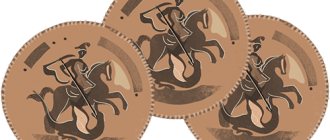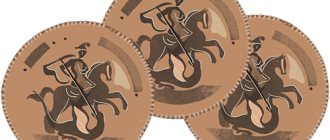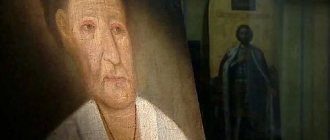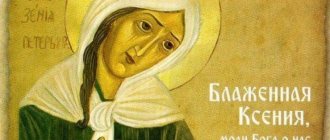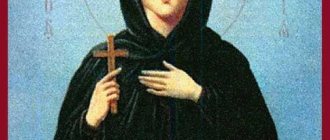Why is Ksenia of Petersburg so beloved among the people?
Ksenia Grigorievna Petrova lived in the city on the Neva not so long ago, in the middle of the 18th century, however, quite little is known about her. She was born into a noble family, approximately between 1719 and 1730, and immediately after coming of age she married a singer who served at the court of Empress Anna Ioannovna, infantry colonel Andrei Fedorovich Petrov. Their family house was located at the very beginning of what is now Lakhtinskaya Street, on the Petrograd side.
The couple lived in perfect harmony for about eight or ten years, but when Ksenia turned 26, her husband died suddenly and unexpectedly. So suddenly that he did not have time to confess before his death. And after this begins the journey that the young woman made from an ordinary woman to Saint Xenia of Petersburg.
Ksenia Petrova took upon herself the feat of foolishness and devoted her life to a single task: to beg God's forgiveness for her suddenly deceased husband. “Ksenia takes upon herself the feat of repentance for her husband, which he did not have time to bring in his life,” says the scientific secretary of the St. Philaret Orthodox Christian Institute, Doctor of Philology, Yulia Balakshina
. - After her husband’s death, the young widow dressed in her husband’s uniform, green and red, and called herself Andrei Fedorovich, telling everyone that it was “My Ksenyushka died and is resting peacefully in the cemetery, but I’m all a sinner here.” Just as decisively as she renounced her own name, Ksenia renounced all her property, giving her house to a young woman who rented a room in it. She distributed all her money to the poor, and took the remaining things to the church “for the repose of the soul of God’s servant Xenia.”
“Ksenia refuses a prosperous, well-established life and begins to lead a miserable, wandering life. At night she carries bricks to build a church, or prays until the morning on her knees, making prostrations. But the main thing is that she helps people with her insightful, prophetic, spiritual advice. After all, a person who overcomes the veil of ordinary, philistine values opens up a special vision, he begins to see the spiritual meaning of things. She was given this vision,” says Yulia Balakshina.
Ksenia began to intercede with God for the people who asked her for prayer. And this idea of her as a prayer intercessor has survived to this day. Even now, outside of earthly life, she continues this feat of prayer for everyone who asks her about it.
Ksenia Petrova decides to live her life as if for her husband, takes upon herself the feat of repentance, which he did not have time to bring in his life. What could be the attitude of the church to the fact that it abandoned its own name and its destiny? “She didn’t live her life for her husband,” says priest Georgy Kochetkov
. – There is simply a connection of love and a responsibility of love. On the one hand, it is impossible to live life for another. But on the other hand, even without him, too - especially if you love a person, especially if you are connected by the same fate. Unfortunately, we live in a time when love is known only as a feeling, and fate is treated either as fate, or vice versa: “I do what I want.” But the mystery of fate is deeper, and if it is connected with Christ, then it is also connected with those whom they love. And then the evil that exists in the lives of our neighbors or friends does not consume our lives, but can be transformed by our loyalty and mercy, our willingness not to abandon a person.”
Alleged portrait of Xenia of Petersburg, late 18th - early 19th centuries, Hermitage, St. Petersburg
LiveInternetLiveInternet
Fools 1884 Let's start with a historical fact. When in 1570 Ivan the Terrible and his army approached the gates of Pskov to do to him the same as before with Novgorod - drown the townspeople in the blood - he was met by a small man in rags named Nikolka Salos, who, upon the Tsar’s entry into the city, began gallop around him on a child’s horse, constantly saying the words: “Ivanushko! Ivanushko! Eat bread and salt, not Christian blood.” When the king, angry, ordered the capture of blessed Nikola, the saint became invisible.
When John left the Trinity Cathedral Church, Nikola met him again and persistently invited him to his cell under the cathedral bell tower. The king agreed, but in his cell a piece of raw meat was waiting for him on a platter. “Eat, Ivanushka,” the holy fool handed a piece of bloody meat to the most formidable of the kings. This annoyed the king. “I am a Christian,” he answered Salos sternly, “and I do not eat meat during Lent.” The saint said to him: “You are doing worse: you feed on human flesh and blood, forgetting not only fasting, but also God!” Angry, Ivan the Terrible ordered the bells of the cathedral church to be removed and the sacristy to be plundered. The holy fool, looking him straight in the eye, said sternly: don’t touch us, passer-by, go quickly away. If you hesitate any longer, you will have nothing to escape from here. Malyuta Skuratov immediately entered, pale with fear, and reported to the king that his beloved horse had fallen. “If you touch anyone in God-saved Pskov,” Blessed Nikola raised his voice, “or start plundering churches, you will immediately die like your horse.” The frightened prince immediately left Pskov and soon returned to Moscow, away from the strange, ragged man and his incriminating speeches. So the absurd, at first glance, act of the frail holy fool Nikolka saved thousands of lives in 1570. In 1547, another holy fool, St. Basil the Blessed, predicted with amazing accuracy a terrible fire in Moscow, and extinguished the raging flames in Veliky Novgorod with 3 glasses of wine. There weren’t many people like Nikolka and Vasily in Rus'—a hundred or two. 16 of them were canonized by the church. On a national scale - a handful, nothing. But perhaps it was precisely this handful that shaped the mentality of an entire nation. Who are they - holy fools? There is a saying: “And do not be curious about incomprehensible objects.” The feat of foolishness refers precisely to this – incomprehensible to our minds. Fools are a walking mystery. This is a phenomenal phenomenon in Russian history. History has brought to us many references to people who are not quite ordinary from the point of view of normal behavior - antisocial behavior, as they would say now. And the word “holy fool” itself is rather negative. Foolishness (from the famous “ourod”, “fool” - fool, crazy, or simply - freak) is a deliberate attempt to appear stupid, insane. Indeed, the holy fool seemed crazy to many people. But not everything was so simple. This category of people, despite all the oddities of their behavior, possessed incredible inner strength, the ability to speak the truth and know things that are inaccessible to an ordinary person. Fools came to Rus' along with Christianity from Byzantium and over time became a specifically Russian phenomenon that has not taken root in any other country in the world. In Byzantium it disappeared without leaving a trace, and in modern Greek there is no such phenomenon as foolishness, and there is not even such a word. And in Rus' it acquired an incredible resonance, and the concept of foolishness went far beyond the religious sphere. IN AND. Surikov. The holy fool is on his knees. 1884-1887 The feat of foolishness in Christ is radically different from the feat of other saints, whose logic of life and actions evoke the admiration of believers and are understandable to a normal person. But here everything is unclear and contradictory. We see before us a person who is not quite normal, stupid, behaving not only in a non-standard way, but often provocatively. Then the question arises - what is sacred in a person in whom there is absolutely nothing worthy of imitation. What can you really imitate – the fact that he disrupts the liturgy, shows sexual aggression, or the fact that he relieves himself in front of everyone? The holy fools really did behave outrageously. They walked around in what their mother gave birth to, shocking the audience. But they walked like this all year round, even in severe cold, freezing their hands and feet. Like St. Basil the Blessed. He was often called Vasily Nagy, and was even depicted naked on icons, which is not at all in Christian traditions. But nudity was not enough for the holy fools. Sometimes they complemented their frightening appearance with metal devices. Nun Alipia Goloseevskaya wore a chain. The Rostov holy fool Stakhy wore an iron camisole weighing 59 pounds, and around his neck were two four-pound weights. Pelageya Diveevskaya, in the already enlightened 19th century, put on an iron belt, which over 8 years firmly grew into her body. Why did these people torture themselves so much? In winter, in rags, hungry, cold, giving yourself up to people’s reproach? This is scarier and harder than any kind of seclusion. Because the holy fool lives among people, each of whom can offend, twist a finger at his temple... One can listen to him, and another can throw a stone. And how many of these holy fools there were, at whom they threw stones! There is a story about a holy fool. In the bitter cold of winter, he tried to settle down with the beggars, but they drove him away. He found some kind of shed where the dogs were hiding, and settled down with the dogs. But even the dogs ran away from him. Imagine what the degree of rejection of this person must be! Fools, as it were, voluntarily invite fire upon themselves - the fire of contempt, mockery, persecution. Why do they need this? This question could be answered this way - why does a person need to love? Isn't it enough to eat, drink and sleep? Why does a person need to suffer? A holy fool is a special kind of inferior, a special kind of sick person. Which at the same time has some quality that everyone else lacks. The holy fool is aggressive, he invades our lives - I won’t let you live here in peace, I won’t let you consider yourself pious Christians. I won't give it to you! I will blow up your world! Our world is complex. Much of it is not accessible to the ordinary human eye. But, as we see, someone still managed to look beyond the fine line. The Church assumes that these people, under certain circumstances, had real experience of communication with God. Faced with a different reality, a different world in their lives, they suddenly decided to change their lives radically. Icon. Basil the Blessed From all the lives of holy fools, we learn that before becoming holy fools, they were in fact ordinary people and led an ordinary lifestyle. For example, St. Basil the Blessed. Vasily was born in December 1469 in the Moscow suburban village of Elokhov, right on the porch, where his mother came to pray for a successful resolution. When the boy grew up, he was apprenticed to a shoemaker. No one knows whether the apprentice made good shoes, but we have heard in detail the story of how Vasily shed tears over a merchant who ordered new boots for himself. “Why are you so upset, Vasily, why are you crying?” - the shoemaker became worried. “Not over what, but over whom,” answered the apprentice. “The man ordered his shoes so that he would never have to wear them out.” He doesn’t take it down, because he’ll die tomorrow.” And the merchant died. After this incident, Vasily never returned to the workshop. His wandering life began. Ksenia of Petersburg, who has been revered as a saint in Rus' for 200 years, was 26 when her husband died unexpectedly and unexpectedly. The young widow, without shedding a tear, for some reason changes into his clothes, calls herself by his name and begins to give away her property right and left. She, of course, is immediately classified as crazy, and her relatives report Ksenia to the police, where after a long conversation she is still recognized as sane. Saint Xenia of Petersburg The ugly Ksenia of Petersburg did not save cities and did not argue with tyrants. Behind all her oddities, only love was hidden. There is a well-known story of one gendarmerie officer who accompanied a mail carriage to St. Petersburg in a severe snowstorm in winter. At the city gates, he noticed a lonely female silhouette. What made her leave the house on such a day and where is she going? When the snowstorm subsided, a picture opened up to the officer’s amazed gaze - an endless snowy plain and a fragile figure kneeling in front. The woman was praying. It was Ksenia Petersburgskaya. Hiding behind the bad weather, she asked for the residents of her city, who laughed at her, and begged the Lord for their sins. The most important and terrible sin, from which all others come, is pride. Pride - it manifests itself in everything. We all have it, we just don't realize it. The canonical list of the 7 deadly sins was compiled in the 6th century by Pope Gregory the Great and has remained unchanged to this day. It includes anger, pride, voluptuousness, despondency (laziness), gluttony, envy and greed. But these 7 sins are highlighted not because they are the most terrible and greatest, but because they inevitably entail all the others. Every day we experience irritation, anger, envy... we lie to ourselves and our loved ones... that is, all our sins immediately creep out. And holy fools are free from these sins. The holy fool does something for which we all lack gunpowder, strength, love, true love. By taking on the image of madness, the holy fool builds a wall between himself and society. And within this life he gains freedom over the world around him. It seems to them that he is weak, but he is much stronger than everyone else, because what attracts any person - power, money, position, good clothes - he does not need. He voluntarily throws all this off himself, he is absolutely free over human passions. And as a result of this freedom, he gains the ability to see and tell people the truth. Foolishness is always the conscience of the people. Foolishness makes it possible to speak on behalf of the people. And people understand this with their hearts. Truth is always revealed in foolishness. One day, Blessed Basil scattered rolls of bread from a baker at the market, and he admitted that he had mixed chalk and lime into the flour. One day, thieves, noticing that the saint was dressed in a good fur coat, given to him by some boyar, decided to deceive it from him; one of them pretended to be dead, and the others asked Vasily for burial. Vasily seemed to cover the dead man with his fur coat, but seeing the deception, he said: “Be you dead from now on for your wickedness; for it is written: let wickedness be consumed.” The deceiver really died. The lesson that foolishness teaches is the lesson that what is visible to the eye is actually a deception. The real meaning of things lies much deeper. The holy fool can speak with a gesture, he can speak with his life, his entire behavior is a special language. During a fire in Kostroma in the 16th century, the governor asked Simon Yurievitsky: “Holy fool, save the city!” In response, he hit the governor in the face with all his might. It was a strange act, a daring act. But the result was even more interesting. The fire stopped immediately. And another time, Simon, for no apparent reason, demonstratively spat on the house where a good, kind man lived. People, who had long been accustomed to Yuryevitsky’s antics, were seriously puzzled this time. Who did the holy fool spit on? People only saw the gesture. And the demon that came out of the house was only a holy fool... Once St. Basil, in front of everyone, smashed with a stone the image of the Mother of God on the Varvarinsky Gate, which had been considered miraculous since ancient times. Pilgrims flocked to him from all over Rus', seeking healing. The crowd attacked him, they beat him to death, and the holy fool says - and you scratch, scratch the paint... People scratch the paint layer and see that under the face of the Mother of God a devilish mug is hiding... Dostoevsky wrote - don’t look at what our man is doing, look to what he strives for. The holy fools had the gift of foresight and healing. One day, Ksenia Petersburgskaya went to see her old friend Paraskeva Antonova, the same one to whom she had given the house, so that she would immediately go to the Smolensk cemetery: “You’re sitting here darning your stockings, but you don’t know that God sent you a son!” Chapel over the grave of Blessed Xenia of Petersburg Paraskeva, in bewilderment, walked towards the cemetery and suddenly saw a crowd of people. It turned out that the crew had crushed to death a pregnant woman who had given birth to a boy before her death. Paraskeva took him for herself, and since she could not find the baby’s father anywhere, she adopted him. The adopted son raised by her revered her as a mother and in her old age protected the peace of Paraskeva, who thanked the blessed one for her great joy. Blessed Xenia carried out the feat of voluntary madness for 45 years and died around 1803. They say that admirers stole almost all the soil from her grave; it was believed that it healed many diseases. And when a slab was installed on the grave, people dismantled it too. Over time, a stone chapel was erected on her grave (at the Smolensk cemetery), which to this day serves as one of the shrines of St. Petersburg, attracting numerous pilgrims. Pilgrims come here from everywhere, praying for the recovery of loved ones, raising children and for love. They say miracles still happen. Blessed Pasha of Sarov Another place of pilgrimage is the cell of Blessed Pasha of Sarov in the Diveyevo Monastery. The holy fool lived in the world until she was 120 years old. These were years of loneliness. Her parents, friends, and children were replaced by several dolls, which she never parted with. In her youth, after the death of her husband, Pasha (then Irina Ivanovna) ran away from her serf masters. She went to Kyiv, where the perspicacious elders blessed her on the path of foolishness and secretly tonsured her into the schema with the name Paraskeva, after which she began to call herself Pasha. The blessed one lived in caves in the Sarov Forest for 30 years. Thin, tall, blackened by the sun, she struck fear into everyone who did not know her. Seeing her ascetic life, people began to turn to her for advice and prayer, and noticed that she was not without the gift of foresight. Praskovya Ivanovna settled in Diveyevo in 1884. She lived in a house at the monastery gates. She became very clean and loved order. She dressed like a child, in bright sundresses. She showed her love for the Queen of Heaven and the saints in a unique way: she either began to treat the icons, or decorated them with flowers, talking affectionately to them. She called the Mother of God “mama behind the glass.” She prayed all night until the morning. They say that during prayer Pasha could rise above the ground. After mass, she worked: knitting stockings or reaping grass with a sickle - under the guise of these activities, she constantly said the Jesus Prayer and bowed to Christ and the Mother of God. From morning to evening, the blessed one received people who came to her, convicting some of secret sins, and accurately predicting the future for others. It was Pasha who predicted the birth of the Tsarevich to the last Russian Emperor Nicholas II. And it was she who claimed that this king would be higher than all other kings. Before her own death in 1915, she kissed a portrait of Nicholas II with the words: “darling is already at the end.” Nothing has changed in Pasha’s cell since the day of her death. Many believers consider touching things to be a great blessing. During the years of Soviet power, holy fools were perceived as an alien church element. Some of them, of course, were shot. But to openly exterminate them would be a mistake, because the Russian people have always pitied the poor. And, in order not to anger the people, the punishment for holy fools was not a huge repressive mechanism, but a system of punitive psychiatry. “Insanity” was the title of the work of one of the psychiatrists of the 19th century, a practicing physician at the Obukhov Hospital in St. Petersburg, Malinovsky, who identified 8 signs by which one could distinguish a madman from a normal person. However, based on these signs, if desired, anyone could be put in a psychiatric hospital... With the advent of the new regime, the history of foolishness in Russia seems to end. And the attitude towards this phenomenon is still ambiguous. Scientists, mostly psychiatrists, are still inclined to judge holy fools as insane people, but with great caution, recognizing their exclusivity. The Church is no less careful. It is just as difficult for her to recognize a real holy fool as it is for scientists. She decides who the true holy fool is after death, and even if miracles happen around a person during life, this still does not mean anything. “We do not evaluate holiness, but God evaluates,” confessors believe. According to historians, the current century has not yet brought new holy fools. Although, perhaps, they live among hundreds and thousands of homeless people, ragamuffins, the insane, simply pretenders and cynical malingerers who have used and are using the popularity of this image for selfish purposes. RasputinPopular rumor endowed the properties of the holy fool Grigory Rasputin. In his youth, after walking to the Athos Monastery in Greece and Jerusalem, Rasputin began to claim that he was a saint and could heal people. One day, according to him, he had a sign - the Mother of God appeared before his eyes, told him about the illness of Tsarevich Alexei and ordered him to go to St. Petersburg and save the heir, which, according to an established fact, he did. The next thing Rasputin did was a career. Using his influence on the royal family, Rasputin took bribes in money and in kind. His drunken brawls and pogroms horrified St. Petersburg. But was Rasputin a holy fool? Can a holy fool be interested in practical problems? He is only interested in the truth as he understands it. During life, the holy fool is rejected - he evokes disgust, pity, condescension, fear, but never sympathy. According to the terms of this subtle (not conceived by man) game, no one should suspect a saint in these crazy provocateurs. His feat is not a feat of man, it is the cooperation of man and God. His mission is to wake human in us - love, compassion, faith. “God chose the non -Western world to shame the wise, and the weak world chose God to shame the strong ...” (from the Epistle of the Holy Apostle Pavel Corinthians) is one of the most beautiful temples of the world - the Moscow temple of the Virgin Protection. In 1555, they began to be built by order of Tsar Ivan the Terrible in honor of the victory over Kazan. Exactly 4 years before that, Judas Vasily was buried here. The legend said that he himself collected money for the future Pokrovsky temple, brought them to Red Square and threw it over his right shoulder - a nickel to the heel, a penny to a penny, and no one, even thieves, touched these coins. And before his death, in August 1552, he gave them to Ivan the Terrible, who soon ordered the temple to build on this place. And so it happened that they erected a monument to the state, but it turned out a tombstone for a puny holy fool. The temple of Basil Blessed - so they still call it, folk, not an official name. There were not many people like Vasily in Rus' - a hundred or two. Their feat is incomprehensible. Does it determine our mentality, or, conversely, our mentality explains that foolishness has gained such popularity in Rus', most likely no one will answer this question ... Arina Mitrofanov
1.
2.
3.
4.
5. 6.
7.
8.
9.
10.
11. Blessed Andrew. 12. St. Basil the Blessed.
13. Vasily Perov. Holy fool.
14. Latyntsev Vladimir Nikolaevich. The prediction of the blessed one.
15. Orlais Bernart the Holy Fool.
16.
17. Latyntsev. Blessed morning.
18.
19. Pavel Svidomsky. Holy fool.
Andrey Medvedev.
Fools have been holy for a long time, And are revered as great heroes, In their honor, cathedrals are built in Zlatoglavaya And they give prophetic meaning to nonsense. It’s easier to be an idiot in Rus' - It’s easier to frighten the throne with madness, And what does the blessed one have clouds over his head, When he has tasted the fruits of heaven... We can easily overcome any temptation, Not in rags - ascetic humility, But the possessed one sees the demon better When he himself is naked, and the devil is wearing makeup. You will think that you are pale and unshaven, the epileptic pounding hour after hour, but if the king sees the Savior in you, then you will be well-fed not only on holiday. Spit more and talk less, Threats of fiery hell and the scaffold - They will give you a new shirt, And they will bring you to the porch of the Third Rome. But, if you raised the cross, then carry it - Ivan Koreysha or Lyova Myshkin, And, if the assumption is not too much, Then orphanage can resurrect the conscience...
Alexander Novikov.
The homeless people were caught. There seem to be fewer of them. In “specialists”, in LTP and in ITK. Church. Day. And you’re wearing a holy fool! He reaches out his hand for a nickel. A creature the size of half a fathom, Gray from head to toe. A shred of St. Basil's - Istov. Pathetic. Hungry. And holy. ...I see... I see... the poor one overlooked... There was an explosion... and the church fell at his feet... Without shouting... without babbling... At his feet... at the feet of the executioner!.. Trophies of Komsomol valor... Shreds from Luke and Matthew... Shreds of Faith!.. Shreds of the Family !.. Satan's spawn!.. Shut up. For a ruble to you, holy fool. Pray for Vera. For my wallet. I'm rich - they don't give me anything. For eternal wealth I am considered a rogue In this defamed paradise. I throw handfuls of my Treasure in front of the people - bitterly prophetic words. Each of us is a holy fool in our own way. Russians. Holy fools. Two.
Who are the blessed ones and what is their holiness?
Priest Georgy Kochetkov spoke in an interview with a MIR 24 correspondent about who the blessed ones are, what their holiness is, and why they were so revered in Rus'.
“Blessed” literally means “happy.” That is, the blessed ones, or holy fools for Christ's sake, were happy. It’s surprising: foolishness and happiness usually don’t go together with us; we don’t correlate these things. We say “blessed”, meaning that a person is a little out of his mind, and sometimes even not a little. But for Christ’s sake, a holy fool is not just some kind of deformity according to the idea of this world, not just a dislocation in relation to the prevailing mentality. Real holy fools are happy precisely because they are not guided by any cliches and standards of this world, which come and are often vicious, the priest explains.
“We often forget that the church does not glorify foolishness in general, but foolishness for the sake of Christ. And everyone who believes in Christ in this world also seems to deviate from the norm, because the law of this world and the law of the Kingdom of Heaven are not at all the same thing. Life in proximity and in the presence of the Kingdom of Heaven is one thing, but life according to the laws of this world is another. And success in these two dimensions is understood in completely different ways, with an emphasis on different concepts, criteria, and realities,” says Georgy Kochetkov.
The blessed ones, holy fools for Christ's sake, often looked like prophets. “The prophets also behaved very strangely, so people were surprised, sometimes they really thought they were crazy,” says the priest. – We often forget who the prophets are. We often understand this a little paganly, superstitiously, thinking that these are soothsayers, although a prophet is one who proclaims the will of God, the truth of God, even when it is inconvenient and unpleasant to many. Even some church leaders are afraid to talk about this prophetic principle in the church, about the fact that the Holy Spirit constantly renews church life and cleanses it of all untruths.”
Holy fools were such prophets. They guided the people, breaking all sorts of cliches and stereotypes both among the church people and in secular society. They might not have been loved, but they were obeyed - even Ivan the Terrible did not dare to touch the holy fools who exposed his crimes to his face.
For Christ's sake, holy fools are blessed, that is, happy, but especially happy - not because they have everything they want, not because they satisfied all their needs, but because the Holy Spirit shone in them and warmed everyone through them because they often spoke from the Spirit and in the Holy Spirit, says the priest.
What does the word “blessed” mean?
Photo: Elitsy.ru
In fact, this title, remarkable in its essence and great in nature, comes from the Greek word “makarios” - happy, doing good. And it has several meanings:
- A Christian who leads a pious lifestyle, living according to God's commandments.
- A saint who performed the feat of foolishness in the name of Christ and became famous for this feat.
- In Russia, this name was used to designate some European saints who did not perform the feat of foolishness, and their veneration began even before the separation of Catholicism and Orthodoxy in 1054. These saints are in the Orthodox calendar and the name “blessed” denotes their unique position (Blessed Augustine, Blessed Jerome)
- An adjective that serves as an addition to the titles of the heads of some Churches.
- Happy man.
Why is Saint Xenia considered the heavenly intercessor of St. Petersburg?
“I once saw a real holy fool. It was a long time ago, half a century ago. He was a wandering man, a layman, not a priest, he walked throughout the entire land of the Soviet Union with such a large staff that it resembled a cross. Outwardly he seemed a little abnormal, but he only seemed so. It was enough to talk to him to understand that this is not so, that he is a wise man, but who abandoned all the blessings of this world in order to carry the message of Christ in the way that was possible at that time. This, after all, is intercession - when a person gives all of himself so that God can be present in the lives of other people. I don’t know his fate, but I remember his image, and it still stands before my eyes,” says Georgy Kochetkov.
“True heavenly intercession, if we understand it churchly, is also connected with the special presence of God, which we feel in life through holy people. This is not some external force that somehow protects us from adversity and difficulties, says Georgy Kochetkov. – Every city is famous, one might even say, boasts of its saints, because this is real wealth. So in Moscow, St. Basil and other holy fools are especially dear to us, because they have this prophetic element, this extreme, even transcendental freedom of spirit, which does not submit to any oppression, any despotism of kings, Caesars, emperors.”
Who else is called blessed?
Photo: Rusdm.ru
We can give examples of heads of Churches that have this title. For example:
- His Beatitude Patriarch of the Holy City of Jerusalem and all Palestine - Theophilus;
- His Beatitude Archbishop of Athens and all Greece - Christadoulus;
- His Beatitude Metropolitan of Warsaw and all Poland - Sawa.
That is, blessed is a loud Christian title.
In Russia, famous blessed people who are revered and loved by all Orthodox Christians are, for example, Xenia of St. Petersburg and St. Basil the Blessed.


